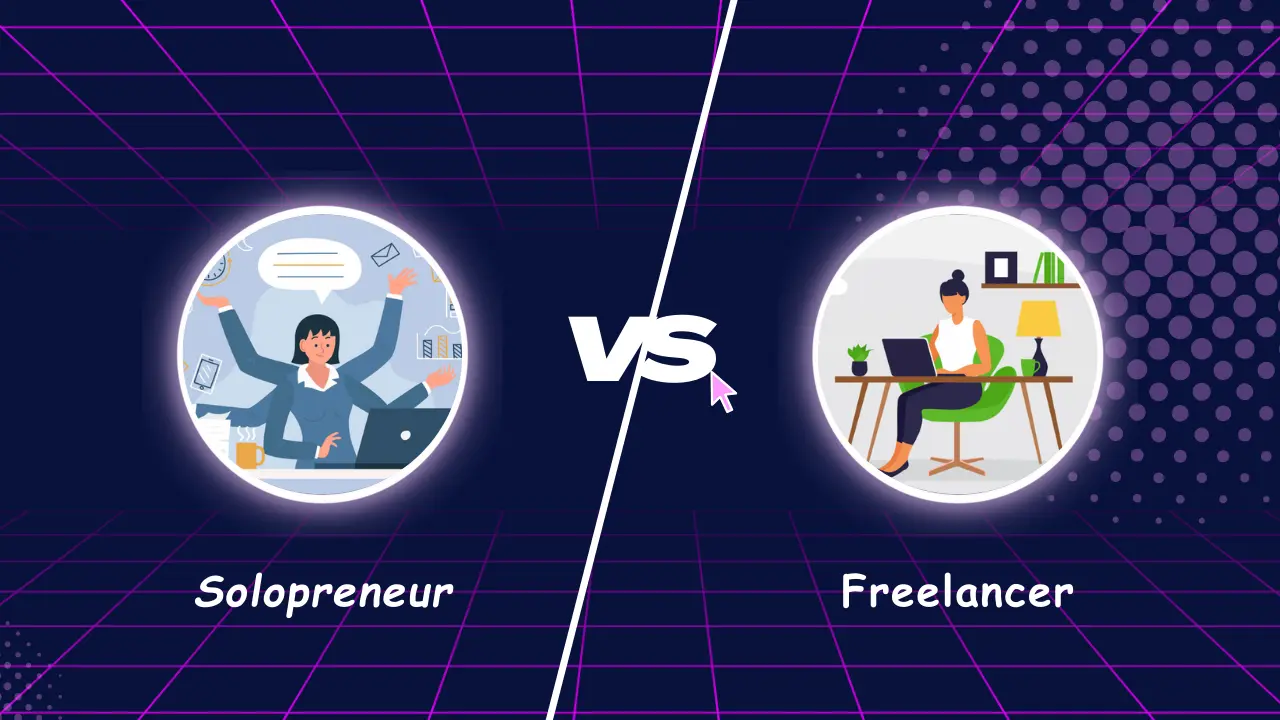In the solopreneur vs freelancer debate, individuals must consider the pros and cons based on their skills, goals, and preferences. In a nutshell, solopreneurs are chasing long-term success with potentially high income, while freelancers enjoy quick access to income by focusing on project-based work.
So, understanding the nuances of each path will enable aspiring professionals to make informed decisions about their independent career journey.
Suppose you know how does online business works, in that case, that’s a plus because we’re now going to break down a few critical aspects of solopreneurs and freelancers, including annual income, profit margins, and best fits.
So that later, the detailed and long-term differences between solopreneur and freelancer become easier for you.
Without further ado, let’s move forward.
Basic Comparison of Solopreneur vs Freelancer
Two popular ways of online business ideas in this world of entrepreneurship are as a solopreneur and as a freelancer. While both involve working independently, they differ in several aspects.
Solopreneur
Let’s see how solopreneur does its functions in terms of startup costs, annual revenue, profit margins, and who best fits in this type of business.
Startup Costs
A solopreneur business usually incurs higher startup costs as it may require investment to develop and launch a product or service. Marketing and branding costs also contribute to the initial investment.
Average Annual Revenue
Solopreneurs generally have higher income potential than freelancers. Their revenue is driven by the success of their business ventures, products, or services.
Average Profit Margins
Individuals in sole proprietorships may experience different profit margins depending on the industry and business model. With strategic planning and scalability in business, they can earn substantial profits.
Time to Revenue
It is a fact that the time required to generate income for solopreneurs is often longer. Because to establish a business, build a customer base, and gain market recognition, it is essential to give the necessary time to the business.
Best Suited For
A sole proprietorship is best suited for individuals with a strong entrepreneurial spirit, an identical business idea, and the ability to independently manage multiple aspects of running a business.
Freelancer
Now, let’s discover the freelancer functions in terms of startup costs, annual revenue, profit margins, and who best fits in this type of business.
Startup Costs
Since freelancers do not need to invest in product or service development, they benefit from lower startup costs. The equipment and tools they need are usually used as initial costs.
Average Annual Revenue
Freelancers usually generate income based on the projects they undertake. Although their earnings may vary, freelancers can earn a steady income by consistently securing projects.
Average Profit Margins
Freelancers may experience slightly lower profit margins due to the high competition and project-based nature of work. However, efficient time management and specialization can increase profitability.
Time to Revenue
It’s true that freelancers can start earning relatively quickly, often after securing their first project. The revenue generation time is shorter than that of solopreneurs, which makes freelancing an attractive option for immediate income.
Best Suited For
It would not be wrong to say that freelancing is suitable for people with special skills in fields like writing, graphic design, programming, or marketing. It is ideal for those who want flexibility and quick entry into the market.
Solopreneurs vs Freelancers: A Vast Comparison
Now it’s time to be patient and sit tight. We are going to explore the comprehensive and detailed comparison between solopreneurs and freelancers, covering various aspects of their professional journeys:
Nature of Work – Solopreneurs
Entrepreneurs in the solopreneur business idea may engage in a variety of tasks including product or service development, marketing, business planning, and customer relationship management. They are responsible for the end-to-end operations of their business.
Nature of Work – Freelancers
These types of people mainly specialize in providing specific services within their expertise. And focuses on project delivery rather than overall business operations.
Client Interaction and Relationships – Solopreneurs
This type of business-minded person acts as their business’s face by maintaining direct and ongoing relationships with clients. They handle negotiations, project discussions, and conflict resolution, fostering a deeper connection.
Client Interaction and Relationships – Freelancers
Typically, the initial client relationship is established for the duration of a project. In this case, communication tends to be project-specific, and the client interaction may not extend beyond the immediate scope of the work.
Income Generation – Solopreneurs
They can generate various revenue streams, which may include product sales, service fees, subscription models, or other revenue generating activities related to their business model.
Income Generation – Freelancers
They earn revenue project by project, with earnings directly tied to the number and scope of projects undertaken. Their income is typically based on service fees charged for specialized skills.
Business Branding – Solopreneurs
This category’s individuals focus on building a comprehensive brand across the entire business. Basically, it involves creating a unique brand identity, voice, and culture to establish a strong market presence.
Business Branding – Freelancers
Basically, freelancers develop a personal brand based on their expertise in a particular skill or niche. Building a reputation for delivering quality work is crucial; freelancers often rely on testimonials and word-of-mouth referrals.
Scalability – Solopreneurs
Solo entrepreneurs aim for scalability by expanding their business operations. This may involve, for example, hiring employees, outsourcing specific tasks, or diversifying product and service offerings to reach a broader audience.
Scalability – Freelancers
They experience limited scalability because their work is often tied directly to their personal time and skills. Technically, scaling efforts usually involve taking on more projects or increasing service rates.
Risk and Responsibility – Solopreneurs
They take full responsibility for their business, including financial risk, decision making, and adapting to market changes. They bear the total weight of the success or failure of the business.
Risk and Responsibility – Freelancers
Freelancers are different in this respect, with low overall risk assumption, primarily focused on delivering quality work. Although they may face uncertainty between projects, their operational risk is generally lower than single occupations.
Brand Loyalty – Solopreneurs
People in this profession strive to build brand loyalty by providing consistent quality, excellent customer service, and a unique brand experience. But on an important note, building a loyal customer base is crucial for sustainable success.
Brand Loyalty – Freelancers
In this regard, freelancers tend to increase client loyalty by providing high-quality work and professional behavior. It goes without saying that repeat business and referrals contribute significantly to a freelancer’s success.
Work Structure – Solopreneurs
Solopreneurs often handle a complex work structure involving various business functions. They may wear multiple hats or hire specialists to manage specific aspects of the business, making a more intricate organizational setup.
Work Structure – Freelancers
Freelancers, in this case, enjoy a simple work structure focused on providing their specialized services. Their workflow is completely project-centric, allowing for a more streamlined and effortless approach.
Long-Term Goals – Solopreneurs
A long-term business aspires to growth, sustainability, and potentially building a brand that can transcend their personal involvement. Moreover, they may want to build a legacy business that extends beyond their individual contributions.
Long-Term Goals – Freelancers
Freelance persons often aim for a steady stream of projects, working to build a reputation as an expert in their niche. Long-term goals may involve maintaining a steady stream of work and expanding their skills in their chosen field.
Autonomy and Flexibility – Solopreneurs
People in this business often enjoy a high level of autonomy but may also find themselves tied to various aspects of running the business. Most interestingly, they have the freedom to make strategic decisions that affect the entire business.
Autonomy and Flexibility – Freelancers
People in this profession often experience flexibility in choosing projects and working hours. They are primarily focused on providing specialized services but have the freedom to choose projects that suit their skills and interests.
Community Engagement – Solopreneurs
People in these businesses are engaged in building a community around their brand or business. This involves, for example, building a network of customers, followers, and collaborators who contribute to the overall success of the business.
Community Engagement – Freelancers
People in this profession often participate in professional communities within their assigned niche. Networking serves as an essential tool for freelancers to connect with potential clients and colleagues. Which, indeed, creates a vast collaboration opportunity.
Creativity and Innovation – Solopreneurs
They constantly engage in creative and innovative efforts to differentiate their business in the market. They have the flexibility to test new ideas and solutions, along with major product or service innovations.
Creativity and Innovation – Freelancers
They channel creativity into delivering high-quality work within their specialized niche or area. While they may innovate within their specific skill set, the focus is primarily on meeting client requirements.
Learning and Skill Development – Solopreneurs
They must constantly expand their skill sets to manage different aspects of their business, from marketing and finance to operations. Lifelong learning is essential if you need to adapt to industry trends and survive in a competitive market.
Learning and Skill Development – Freelancers
Professional development often involves mastering the latest tools, techniques, or trends within their specific niche. Prioritize honing their specialized skills to offer exceptional services.
Operational Scale – Solopreneurs
A sole proprietorship always sets goals for a bigger operational scale by potentially expanding its team, introducing new products or services, and entering new markets. Because the main focus is on achieving economies of scale.
Operational Scale – Freelancers
In contrast to solopreneurs, they operate on a smaller scale, with a more focused approach to delivering specialized services. It would not be wrong to say that expansion usually involves increasing individual capacity rather than building a larger organizational structure.
Adaptability to Market Changes – Solopreneurs
Since they navigate the evolving business landscape, they must be highly adaptable to market changes. They must actively adjust strategies constantly to stay relevant and competitive.
Adaptability to Market Changes – Freelancers
They adapt to changes within specific niches or industries but have a more targeted focus. Adaptability is often related to mastering new skills or technologies within their chosen field.
Decision-Making Process – Solopreneurs
It is essential to make strategic decisions or initiatives that affect the entire business. This decision-making involves, for example, considering long-term goals, market trends, and potential risks associated with the overall business operation.
Decision-Making Process – Freelancers
They only focus on project-specific decision-making, often in consultation with the client. These decisions involve meeting project requirements, timelines, and ensuring client satisfaction.
Exit Strategy – Solopreneurs
They can immediately plan an exit strategy that involves selling the business internally, handing it over to a successor, or transferring to a different role within the company. On a quick note, the exit strategy is tied to a long-term view of the business.
Exit Strategy – Freelancers
Exit strategies in freelancing may involve moving to a different niche, retiring from freelance work, or using their skills to offer consulting services. Moreover, the focus is on personal career evolution rather than business sales.
Final Thought
In this vast comparison of solopreneur vs freelancer, it’s evident that both solopreneurship and freelancing offer unique paths with distinct advantages and challenges. The choice between the two depends on individual preferences, skills, and long-term goals.
Whether one pursues a comprehensive approach to solopreneurship or a particular focus on freelancing. Both paths offer exciting opportunities for personal and professional growth in the evolving landscape of independent work.
While both paths offer unique opportunities, the choice ultimately hinges on individual goals, preferences, and the desired level of involvement in the broader business landscape.




